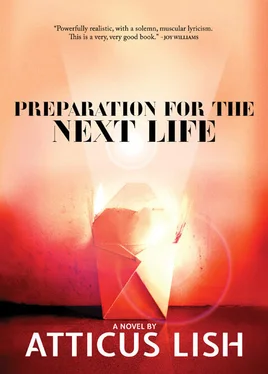When they tried to go inside, the security man at the doorway said, Can I help you?
Both he and his partner were wearing bulletproof vests and Police windbreakers. The second cop was Hispanic and stood with his jump boots planted wide apart.
Skinner said, We’re looking for the place where you get married.
That’s not here. He advised him of the correct address, but in a manner that was too rapid to be understood.
Where’s that?
Two blocks back that way. Give you five minutes to think about it.
I’ve thought about it.
That’s good.
Have a nice day, sir.
I’ve thought about it. I don’t need to think about it.
Both cops turned their attention on Skinner in a particular way, suggesting a potentially higher level of interest in him. With their guns and gear, they outweighed him by at least three hundred pounds.
Have a nice day, they told him.
Skinner rejoined Zou Lei, who was waiting for him at the end of the courtyard, out of sight.
You don’t have to fight with them.
She kept walking and he followed her. They went back through the plaza with the modern art and the colonnaded higher court buildings. The tourists joked in Dutch and Italian, and underneath their voices, the silence of the plaza was huge, ringed by empty streets and sentries drinking coffee.
They found they had been sent to the same building the criminal courts were in. There was a hot dog vendor on the corner where guys in suits — grooms and defendants — were eating pretzels. The marriage office was on the side facing south. The brass door was pushed open and an interracial couple came running out: a young woman holding up her wedding dress and a black guy wearing a pinstripe suit that was tight around his thighs. She had a white flower in her blond hair. Skinner moved in and grabbed the heavy door before it closed and opened it for Zou Lei, who entered in her jeans.
The granite floor in the lobby was the color of red earth and the shaded lamps gave the space a candlelit appearance. There was a velvet rope, as at a club. They got in line behind a large party of Spanish people who had come with a bride in a pink wedding dress who was taller than her mother. Someone was carrying a camera with a professional flash. The vaulted ceiling sent down the echoes of their footsteps and laughter. The brother and father were wearing black formal suits and cowboy boots. Zou Lei and Skinner didn’t speak. She looked past the information desk. Deeper inside the room, wedding parties were standing at touch screen terminals, applying for marriage licenses. The information desk was manned by a young Asian American man, a college graduate, who spoke accent-free English.
When it was their turn, Zou Lei and Skinner went up to the counter and Zou Lei asked how you got married. The young man placed an information card on the countertop and turned it so she could see it. You bring me your passport, driver’s license, then you go to the kiosk, apply for your license, and pay the fee. When the application prints out, you can come back and see the judge in 24 hours, unless you’re active duty military, then you can do it sooner.
Zou Lei leaned on the counter, holding her head, studying the requirements on the card. The young man looked at the line behind her.
If you need to think about it, you can wait over there.
Give her a second, Skinner said. We might have a question.
Are you the groom?
Yeah.
What if it’s some problem with the ID? Zou Lei asked.
Do you have a passport?
Maybe I have, but I want to use some ID from out-of-state.
That’s fine.
I think it over.
The clerk took the information card back from her.
She needs that, Skinner said.
He gave her the card back.
Sorry about that. Anything else I can help you with?
Zou Lei said no and she and Skinner left the office. Around back of the Metropolitan Detention Center there was a park and through the spiked iron fence you could see the signs for Bail Bonds and diseased old saloons with blackened windows. She took her ID out and rubbed it with her thumb and looked at it. Skinner sat on a green bench and smoked a Marlboro and watched Chinese people of an older generation playing mahjong among the pigeons.
If she registered her marriage using a fake ID and an alias, would the marriage be legally legitimate? She went to the law office to ask the Mandarin-speaking clerk with whom she had spoken earlier. The woman told her to get married using her real name. But how was she supposed to do that? The woman told her she could go to the DMV to apply for a New York State ID card. She had forgotten the details of Zou Lei’s situation. Zou Lei reminded her that she didn’t have papers. The woman said she remembered now. The office was busy. She told Zou Lei she should come back later.
Zou Lei went to the City Clerk’s Office again, intending to ask about the requirements for applying for an ID card, and waited to speak to the assistant. He must have misunderstood her. He wrote an address on a scrap of white paper and gave it to her. She hurried outside and realized she didn’t know what it was for.
Skinner, medicated, depressed, and nihilistic, sat slumped in the basement watching IEDs exploding on his laptop, Iraqis getting shot and flopping down, the world ending one person at a time. The line shortening, getting closer to him, his turn approaching.
At work they cut her hours again. When there wasn’t enough for her to do, a frequent occurrence, she loitered in the back hallway that connected the kitchens, talking with the Mexicans, Tomas and Miguel. She wiped her hands, went over to the chopping table, spent the afternoon making dumplings and shelling snow peas or washing dishes. Her time up front was over.
If they cut her hours any more, she was going to have to go back to collecting cans, just as she had done to survive in the brigade fields of central China.
She took a bathroom break to read the classifieds.
Class A license, $Opportunity$, Mac Operator, see Ms. Chen, must speak a mouth of fluent English. Garment, Bayshine, ladies missy fashion, patternmaker, Cantonese preferred. Earnestly seeking Junior CAD. Brooklyn nanny, Heaven Pest Control, housekeeper, egg donor, masseuse.
The next morning, she went to the park late, sometime after nine, and started running, thinking about what to do. When she got to the basketball courts, she didn’t have a reason to stop. She crossed the fence line that demarcated the end of the field and kept running in the bright sun, her pace picking up. She didn’t have work today. The grass and trees and the exhaust-filled atmosphere trapped the heat. She crossed a road where the cab of a tractor-trailer was parked alone. It looked like a mutant part, a head on wheels, whose weirdness could be seen now that it had broken off and escaped from the trailer. The parkland continued on the other side of the road, turned into a golf course, seen through trees to her right. The sun rose higher. She ran over a highway and through a factory lot, oil rags dried to the asphalt. She was headed for the buildings that she thought of as her mountains. She had stopped thinking about him. Sweat poured out of her, sweating her t-shirt across her breasts. She got a saddle-shaped patch of wet on the seat of her jean shorts as if she were riding a wet horse. It was approaching noon. The towers had been very far away after all. Where the grass ended, she gazed around her in the dazzling sun. She stopped. Her socks were soaked. She peeled her shirt away from her chest and flapped it. The garbage lay on the ground becoming part of it. The tall buildings that resembled mountains were simply government projects, silent in the ticking heat. That was all they were.
Читать дальше












